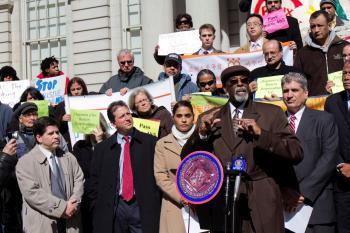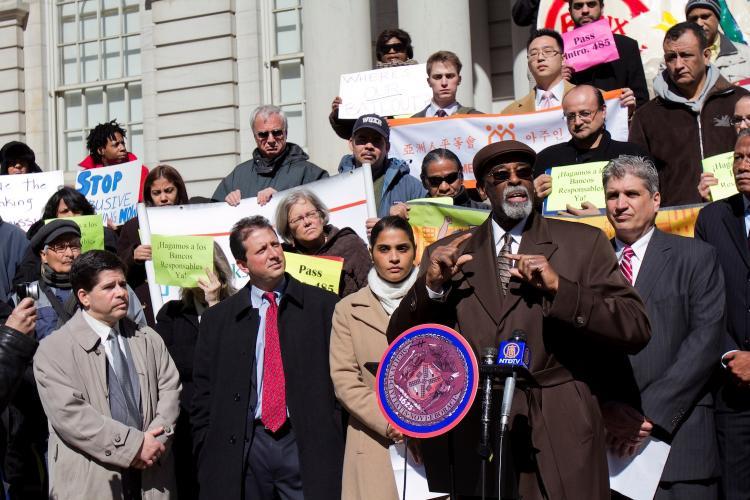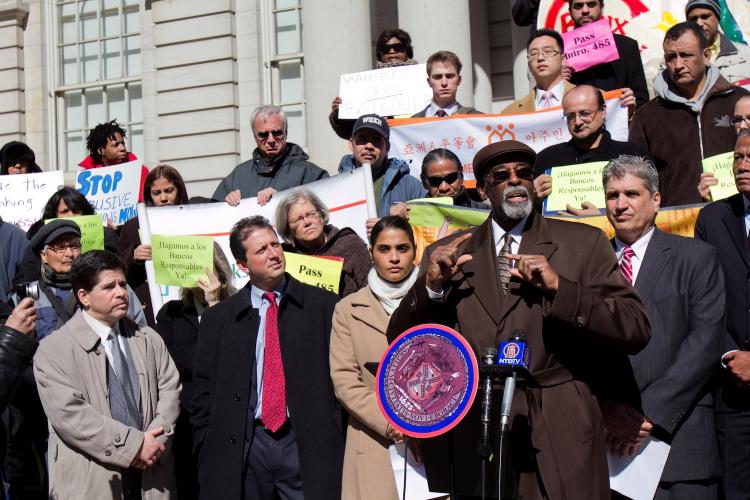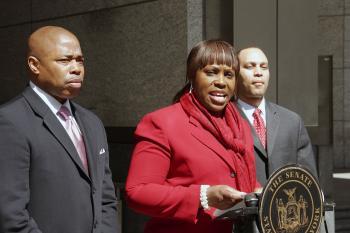NEW YORK—City Council members gathered on the steps of City Hall on Monday, calling for greater accountability from banks and passage of the Responsible Banking Act (RBA). The law, recently introduced in the council, would use the city’s economic leverage to require that banks give reasonable loans and better banking services to working class and low-income New Yorkers.
The bill is essential because affordable housing is in high demand and many city homeowners are losing their properties to foreclosure, said Councilman Albert Vann.
“We also know that a lot of small businesses are not making it because they are not getting the kind of loans that they need to keep their businesses afloat,” said Vann. “These problems could be resolved if we get support from the local banks where we deposit our money.”
The RBA will require banks to release their strategic plans, policies, progress reports, and other important information to elected officials and community groups. It will target banks eligible to provide depository services to the city, and create a ranking system of banks seeking city deposits based on their level of responsiveness to the credit needs of New Yorkers.
“Banks that act as city depositories are profiting from the city,” said Councilman Domenic Recchia Jr., chairman of the Finance Committee, “and they should be supporting New York’s homeowners and small businesses.”
“Essentially, if a bank is making money from New Yorkers, they should be sticking up for New Yorkers. This rating system would show which banks are working with their communities, and I believe it will serve an encouragement for banks to get more involved in the local communities,” explained Recchia Jr.
A $60 billion depository is the greatest incentive there is, according to Councilwoman Diana Reyna.
“The bank that wants access to those billions of dollars needs to be practicing good social policies, good social reinvestments amongst our communities in the city of New York,” stated Reyna.
Advocates of RBA commented on the benefits of passing this law.
“It will help many people in our neighborhoods who have been victims of predatory lending,” said Reverend Lancelot Waldron, pastor of the Westbury Community Church and president of the Queens Congregation United Union (QCUA).
Passing the bill will help to make banks more responsible in modifying loans and mortgages of church members.
“They will be able to stay in their homes because many of them are in danger of foreclosure right now,” said Waldron.
Currently, large banks such as Chase Manhattan and Citibank are not responding to our needs, stated Waldron.
“By this Responsible Banking Act, these large banks will be able to meet the needs of the low income neighborhoods where most of our churches are. We also find that many of these banks are not present in our neighborhoods,” said Waldron.
Association for Neighborhood and Housing Development Executive Director Benjamin Dulchin reiterated the importance of getting this new law passed to get banks to invest responsibly in our communities.
“Without appropriate and healthy flow of credit, our neighborhoods will not be able to thrive,” said Dulchin.
When asked why the banks are not responding, Dulchin responded, “I think that they like to act in an environment where they have no obligation but to maximize their profits at the expense of everybody else and we need to have healthy responsible government regulation” to hold them accountable.
However, according to their website information, banks like Citibank and the J.P. Morgan Chase Foundation, state their commitment to community reinvestment. Chase says it focuses on arts and culture, community development, and pre-collegiate education to foster vibrant communities while Citibank says it is involved in lending, investing, and providing services to promote better communities across the United States.
The bill is essential because affordable housing is in high demand and many city homeowners are losing their properties to foreclosure, said Councilman Albert Vann.
“We also know that a lot of small businesses are not making it because they are not getting the kind of loans that they need to keep their businesses afloat,” said Vann. “These problems could be resolved if we get support from the local banks where we deposit our money.”
The RBA will require banks to release their strategic plans, policies, progress reports, and other important information to elected officials and community groups. It will target banks eligible to provide depository services to the city, and create a ranking system of banks seeking city deposits based on their level of responsiveness to the credit needs of New Yorkers.
“Banks that act as city depositories are profiting from the city,” said Councilman Domenic Recchia Jr., chairman of the Finance Committee, “and they should be supporting New York’s homeowners and small businesses.”
“Essentially, if a bank is making money from New Yorkers, they should be sticking up for New Yorkers. This rating system would show which banks are working with their communities, and I believe it will serve an encouragement for banks to get more involved in the local communities,” explained Recchia Jr.
A $60 billion depository is the greatest incentive there is, according to Councilwoman Diana Reyna.
“The bank that wants access to those billions of dollars needs to be practicing good social policies, good social reinvestments amongst our communities in the city of New York,” stated Reyna.
Advocates of RBA commented on the benefits of passing this law.
“It will help many people in our neighborhoods who have been victims of predatory lending,” said Reverend Lancelot Waldron, pastor of the Westbury Community Church and president of the Queens Congregation United Union (QCUA).
Passing the bill will help to make banks more responsible in modifying loans and mortgages of church members.
“They will be able to stay in their homes because many of them are in danger of foreclosure right now,” said Waldron.
Currently, large banks such as Chase Manhattan and Citibank are not responding to our needs, stated Waldron.
“By this Responsible Banking Act, these large banks will be able to meet the needs of the low income neighborhoods where most of our churches are. We also find that many of these banks are not present in our neighborhoods,” said Waldron.
Association for Neighborhood and Housing Development Executive Director Benjamin Dulchin reiterated the importance of getting this new law passed to get banks to invest responsibly in our communities.
“Without appropriate and healthy flow of credit, our neighborhoods will not be able to thrive,” said Dulchin.
When asked why the banks are not responding, Dulchin responded, “I think that they like to act in an environment where they have no obligation but to maximize their profits at the expense of everybody else and we need to have healthy responsible government regulation” to hold them accountable.
However, according to their website information, banks like Citibank and the J.P. Morgan Chase Foundation, state their commitment to community reinvestment. Chase says it focuses on arts and culture, community development, and pre-collegiate education to foster vibrant communities while Citibank says it is involved in lending, investing, and providing services to promote better communities across the United States.






